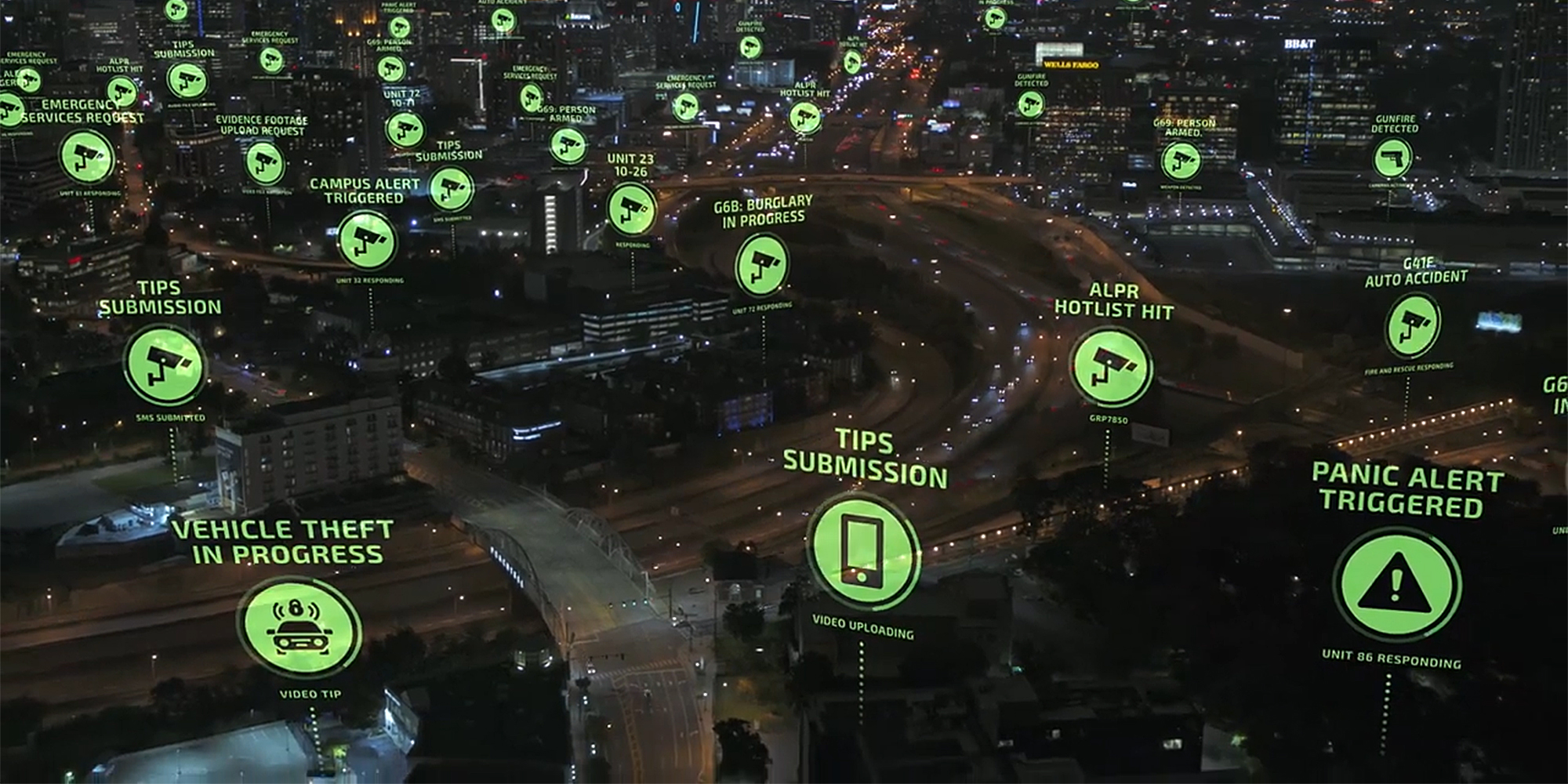On May 3, a gunman opened fire at Northside Hospital Medical Midtown in Atlanta. According to records obtained by the Daily Dot, one person was killed, and four others were injured.
Police did not arrest the suspect on the scene but apprehended him several hours later.
The Atlanta Police Department said that Fusus, a Georgia-based tech company that creates and assists “Real Time Crime Centers” for police departments around the country, was necessary for locating the suspect.
“The camera system on May 3 was vital for us to quickly identify and locate and apprehend this individual that was causing harm to our city,” said Atlanta Police Chief Darin Schierbaum in an Instagram post on May 4, 2023.
The highly publicized case was one of several that Atlanta has pointed to as Fusus hypes itself nationwide.
Fusus describes itself as the “most widely used and trusted Real-Time Crime Center platform in U.S. Public Safety,” according to its website.
The goal is to get security footage that may have captured crimes or incidents to police officers as quickly as possible.
Police pay a yearly fee for access to Fusus’ technology. According to contract documents obtained by the Daily Dot, the price varies from $50,000 to $150,000 a year.
Reuters says Fusus is used in more than 70 police departments around the country. Given the scope and reach of Fusus, the lucrative contracts could add up to anywhere from $4 to 7 million a year.
Fusus, a for-profit company, promotes its system to police using a variety of methods.
It sends departments case studies of crimes that have been solved using Fusus—and at least one major crime that was solved without it. It also sends departments free fususCORE devices, which allow cameras to live stream video footage to Fusus’ platform, with the owner’s permission, that police can distribute.
Camera owners who use Fusus can decide if they want to live stream their cameras all the time or provide access only when an incident has been reported.
But seemingly absent from Fusus’ promotion are any company-created reports or statistics showing the effectiveness of the company’s technology, leaving departments to rely on case studies and their own observations.
Three departments the Daily Dot spoke to—the Lexington, Atlanta, and Rialto Police Departments—all said they had never received any reports or statistics from the company.
Beryl Lipton, an investigative researcher with the Electronic Frontier Foundation, said it is hard to create a report about effective surveillance practices because there are no end goals or accomplishments to measure outcomes against.
“There aren’t good studies—good, replicable reports—that have been done on how effective at solving and addressing crime rates these technologies actually are,” Lipton said.
The three departments all said they did their own research on the technology, including reaching out to other departments that were already using Fusus. Lexington Police Department Cmdr. Matt Greathouse said his department also compared Fusus to other similar platforms before making its decision.
Without statistics, Fusus instead focuses on case studies in which its technology helped officers.
In January, Rick Butsko, a Fusus Public Safety Advisor, emailed members of the Dayton Police Department a video created by the Atlanta Police Department after it used Fusus to locate a missing elderly woman. Butsko suggested the video be played during Dayton’s community engagement meetings discussing Fusus.
Another email from Butsko included an attachment of a copy of the police affidavit from the murder of four University of Idaho students in November of 2022 that captivated the internet. The affidavit includes references to a “video canvas” following the murders. Officers used surveillance footage to identify the suspect’s vehicle and piece together where the car went the night of the murders.
“I am particularly interested in how technology, specifically the quick availability of video surveillance for the police, was a factor in capturing this suspect,” Butsko wrote to the Dayton Police Department.
One department member said it was “very interesting.”
Officers investigating the Idaho murders did not use Fusus in their investigation.
Departments that want funding for the program also struggled to find clear success stories.
The Ohio Attorney General’s Office funds Fusus in Dayton through the state’s TALEN program.
In August, the office needed funding to extend the program and asked the Dayton Police Department for examples of Fusus being used to solve crimes to make a “success-story package,” according to emails obtained by the Daily Dot.
Fusus promises to get video evidence to officers faster than previous methods. It offers technology and cloud-based storage to police departments around the country. Businesses and residents can purchase fususCORE devices from the company to integrate their cameras with the Fusus dashboard, called fususONE.
According to documents obtained from the Columbia Police Department in Missouri, Fusus allows police to access cameras immediately. Instead of asking for security footage, police can view a live stream or access stored footage of cameras fully integrated with Fusus. Officers can also request footage from cameras registered with Fusus.
As long as the camera is streaming, police can look at footage as incidents occur and, like in Atlanta, use it to locate suspects.
Police say this greatly lessens the amount of time it takes to locate and use video evidence, but some activists and business owners have raised concerns about excessive surveillance.
Fusus also provides free fususCORE devices that police can use on public cameras or distribute to businesses, according to contracts obtained by the Daily Dot.
These free devices can add up to a big discount. According to documents, the Columbia Police Department would have been sent over $50,000 worth of free devices if the city council had approved funding for the technology, which it did not.
Lexington, Kentucky, did receive over $50,000 in free devices. Fort Bend, Texas, and Warner Robins, Georgia, received $14,000 worth of free devices, according to their quotes from Fusus.
The fususCORE devices can cost anywhere from $200 to $5,000. To stream, device owners must pay a yearly subscription fee to Fusus ranging from $150 to $2,300 depending on what device they own.
This additional price tag means the public also has to buy into Fusus.
Fusus and police say businesses should integrate their cameras because it will enhance safety. The company says its platform improves community relationships between police and citizens because officers and citizens can communicate with each other through the platform. It says this improves trust.
Cpl. Mike Martinez with the Rialto Police Department says one of the biggest challenges to getting businesses to sign up for the program is the “big brother mentality,” a sentiment echoed by the Lexington and Atlanta police departments. All three departments say they do their best to explain their department’s policies against abuse of the technology.
“We completely understand,” said Martinez. “We really do. We just try to explain to them… the benefits and if they buy into it, so be it, if not, then they don’t.”
Camera owners also have the option to register their cameras, rather than buy a device allowing them to stream. In that case, officers will know there is a camera at the registered location and can get in contact with the owners as needed.
City and town leaderships often also need to buy into the program. Many police departments must seek funding approval to pay for Fusus. Others simply need their leadership to approve the use of the technology.
The Dayton Police Department knew their presentation at the Dayton City Commission meeting on Feb. 15, 2023, had to be worded carefully, according to emails obtained by the Daily Dot, to get the initial Fusus contract approved.
“I would caution that we should avoid the appearance of a ‘sales pitch,’” said Joseph Parlette, the Dayton deputy city manager, in an email. “Some critics have said as much about the ALPR (Automatic License Plate Reader) presentation. At the same time, we need the sales pitch, so good luck with that!”
Department members were considering whether to include a video of mayors around the country speaking about Fusus in their presentation. Some thought since it focused on Fusus’ technology, rather than the company itself, it would be a good choice. Others thought it veered too close to a “sales pitch.”
“The stress needs to be what the technology is and the fact that this is strictly voluntary for the camera owners,” said Director and Chief of Police Kamran Afzal in an email. “We need to show the technology, benefits, concerns, and the fact that it is a voluntary program using existing cameras and not adding cameras as we see fit.”
The Dayton City Council approved the use of Fusus.
Once a police department has approval, the next challenge is to get the public to purchase the fususCORE device or to register their cameras.
Police departments sometimes use social media to promote Fusus. On Sept. 12, the Instagram account for the Rialto Police Department, @rialtopolice, posted about a suspect who was arrested with the help of Fusus.
According to the post, a suspect waved a firearm at someone in the drive-thru line at Chick-fil-A. That Chick-fil-A location is registered with Fusus.
Fusus is responsible for managing the registration and integration of cameras through websites, like this one for Lexington, Kentucky, where businesses and residents sign up for the program. According to contracts obtained by the Daily Dot, the company creates the websites for most departments. Residents and businesses can buy fususCORE devices through the website.
Using video footage, Rialto police could identify the victim and use the footage as evidence. Witnesses provided police with the license plate allowing them to identify the suspect’s car.
“This is a great example of how businesses that enroll in the Fusus program can assist the Rialto Police Department solve crimes more efficiently should a crime occur on their property,” the post said.
Lipton, with the Electronic Frontier Foundation, says police need to be careful about using private entities while policing.
“There is a problem with the way that law enforcement seems to act as marketing representatives for the technology,” Lipton said. Fusus is a for-profit company, meaning money spent by businesses and residents to integrate their cameras is going to Fusus.
Martinez says the Rialto Police Department does not use social media posts to encourage people to sign up for Fusus.
“We use it … to inform our residents that we have these options available to them,” he said. “We totally leave it up to them if they want to, you know, participate in the registration program. It’s all voluntary.”
Lt. Brandon Barth of the Atlanta Police Department says the department tries to steer clear of marketing Fusus.
“We have the Atlanta Police Foundation actually facilitating the integration of the cameras because we don’t want the police department actually promoting or selling the product,” Barth said.
The Atlanta Police Foundation is a nonprofit organization that aims to improve public safety. They created the ConnectAtlanta program, the program that brought Fusus to the department. COO Greg McNiff said the Atlanta Police Foundation initially provided funding for Fusus, but the funding now comes from the department budget. It frequently provides support for the police, according to its website.
McNiff says officers with the police department are still doing some level of marketing when they talk about the program, but that it is at the base level. Instead of direct promotion, the department focuses on Fusus success stories, like the Northside Hospital Medical Midtown shooting. Barth said officers used Fusus registered and integrated cameras in their search.
The day after the shooting, the Atlanta Police Department mentioned Fusus in an Instagram video where Schierbaum thanked Atlanta citizens and their partners, including the FBI and Georgia State University, but stopped short of promoting the technology.
Barth says this is one of the ways the Atlanta department encourages the public to integrate and register their cameras. Another way is to include the link to ConnectAtlanta on the officer's business cards. The Atlanta Police Foundation created the ConnectAtlanta website. McNiff says Fusus is now also involved in the website, especially with the sales portion.
“We’re just letting people know that there is a way … to increase awareness and assist the police department,” Barth said.
The Lexington and Rialto police departments also rely on officer interactions to spread the word about Fusus. Greathouse says one way they do this is by mentioning Fusus to victims or witnesses of crimes who already own cameras.
“Those one-on-one contacts at the grassroot level from the officers and the investigators, those are where I think we’re going to get our large numbers,” Greathouse said. “And then when those neighbors talk to their neighbors who then talk to their neighbors, that’s how our system is going to grow.”
Barth, Greathouse, and Major Paul Saunders with the Dayton Police Department all said their departments are involved in community meetings discussing Fusus with citizens.
“We are still giving these presentations,” said Greathouse. “Anybody that wants to come is absolutely free to come. We will bring anyone in our community.”
Saunders also said the department’s community engagement unit is involved in educating businesses and organizations in Dayton about the program.
In Rialto, only businesses, not residential locations, can integrate their cameras with the fususCORE devices. While businesses still purchase the device themselves, the Rialto Police Department pays for the yearly fee.
“You’re trying to get, you know, for businesses to buy into it, so we’re trying to find a happy medium of compromise here,” Martinez said. “And right now, that’s what we’re using.”
None of the departments the Daily Dot spoke to have produced reports on Fusus’ effectiveness, but Greathouse says all departments can perform audits of the system. This allows departments to see which officers access the platform and when. Greathouse says audits of the Lexington Police Department’s Fusus use will be posted on its transparency page.
What officers can look to are their success stories, times when they say Fusus helped them solve crimes, locate suspects, or gather evidence, like during Atlanta’s active shooter in May. But it is not always easy.
“My hardest job is, you know, trying to find success stories where officers or investigators are using the platform to solve crimes,” said Barth. He also said the department needs to develop its Real Time Crime Center to make it easier to keep track of when Fusus is used.
Fusus’ website mentions statistics about specific departments in which Fusus technology clearly assisted police in solving crimes. But other examples provided only mentioned higher rates of solved crimes, and say Fusus is part of the reason why.
One example was Atlanta’s homicide closure rate. Fusus says Atlanta’s closure rate in 2022 was 82%, higher than the nationwide average of 52%, and said it was “thanks to important community policing programs like ConnectAtlanta.”
All four departments the Daily Dot spoke to say the Fusus system has helped their department. Martinez said Fusus has “absolutely” made a difference in the Rialto Police Department’s crime-solving capabilities, as well as their traffic investigations.
Barth said the technology has helped Atlanta police “significantly,” and said it makes it easier to share resources with neighboring agencies. Greathouse and Saunders say it allows their departments to find and access evidence much faster.
Police see a difference in their ability to solve crime and want to continue to promote Fusus in their communities.
“I think getting the buy-in from the community is our best path forward to increasing our camera coverage throughout the city, making the city safer for residents and visitors,” Barth said.







